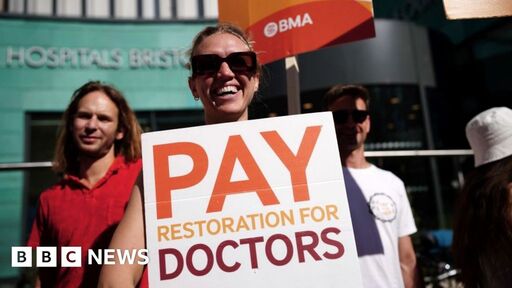The trouble with over a decade of failing to raise pay in the public sector in line with inflation is that eventually you run out of other people’s free labour.
As for this bit: “NHS England and ministers have both said strikes by doctors are a factor in the rising number of people waiting for treatment.”
The waiting list began to slide in around 2011-2012 and progressively grew until 2020 when it then began to skyrocket. The problems predate the current strike action.
My friend has recently joined the NHS as a doctor’s assistant for clinics in a hospital. No training, shit pay: if not minimum wage, very close to it.
Hearing him talk about the job, it sounds like they’re essentially making him do the work of a nurse without the pesky pay and training of hiring a nurse.
There may be an argument that if training isn’t necessary for a given job, maybe it shouldn’t be a requirement to do the job.
I recall listening to a podcast a few years back talking about how RNs (registered nurses) here in the US were taking over some portion of work that had been previously only permitted to be done by doctors, because it really didn’t require a doctor’s training. That reduces costs, and isn’t a problem, as long as the training that an RN has is sufficient to do the job.
https://www.bls.gov/ooh/healthcare/registered-nurses.htm
2021 median registered nurse pay: $77,600 per year
https://www.bls.gov/ooh/healthcare/physicians-and-surgeons.htm
2021 median physician/surgeon pay: This wage is equal to or greater than $208,000 per year
If you’re requiring the latter to do work that the former can do perfectly well, you’re imposing a lot of unnecessary expense on the medical system, basically limiting yourself to a workforce doing those tasks that is a third the size.
The thing I’d look for to see whether too-low training mandates are a problem is whether one had unacceptably high rates of error and whether, upon investigation, those were traced back to limited training.
I mean, the private US system is very different, and the pay is wildly different haha. He’s on closer to £18,525 ($23,459.90). It looks like the average nurse with 5 years experience, is in the £36,500 range. ($46,223.40).
For context, the average house in my (very rural) area is £350,477
This is the best summary I could come up with:
Junior doctors and consultants in England are to coincide strikes during the autumn in an escalation of the pay row with the government.
Alongside junior doctors and consultants, nurses, ambulance workers, physios and radiographers have all also taken part in strikes.
Sir Julian Hartley, chief executive at NHS Providers, which represents health managers, said the co-ordinated action was a “serious escalation” of the dispute.
"We now face the grim prospect of another six months of walkouts from junior doctors, which will pile even more pressure on the NHS this winter, causing yet more disruption for patients.
Health Secretary Steve Barclay said the ballot result was “extremely disappointing” and would weigh heavily on the rest of the workforce and patients who were both “shouldering the brunt of the BMA’s relentless strike action”.
If you are reading this page and can’t see the form you will need to visit the mobile version of the BBC website to submit your question or comment or you can email us at [email protected].
The original article contains 640 words, the summary contains 167 words. Saved 74%. I’m a bot and I’m open source!



